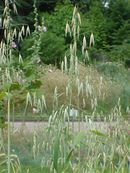Weed Technology (2014) 28, 486-493
From Pestinfo-Wiki
 | Selected publication you are invited to contribute to the discussion section (above tab) |
High seed retention at maturity of annual weeds infesting crop fields highlights the potential for harvest weed seed control
Weed Technology 28 (3), 486-493
Abstract: Seed production of annual weeds persisting through cropping phases replenishes/establishes viable seed banks from which these weeds will continue to interfere with crop production. Harvest weed seed control (HWSC) systems are now viewed as an effective means of interrupting this process by targeting mature weed seed, preventing seed bank inputs. However, the efficacy of these systems is directly related to the proportion of total seed production that the targeted weed species retains (seed retention) at crop maturity. This study determined the seed retention of the four dominant annual weeds of Australian cropping systems - annual ryegrass, wild radish, brome grass, and wild oat. Beginning at the first opportunity for wheat harvest and on a weekly basis for 28 d afterwards the proportion of total seed production retained above a 15 cm harvest cutting height was determined for these weed species present in wheat crops at nine locations across the Western Australian (WA) wheat-belt. Very high proportions of total seed production were retained at wheat crop maturity for annual ryegrass (85%), wild radish (99%), brome grass (77%), and wild oat (84%). Importantly, seed retention remained high for annual ryegrass and wild radish throughout the 28 d harvest period. At the end of this period, 63 and 79% of total seed production for annual ryegrass and wild radish respectively, was retained above harvest cutting height. However, seed retention for brome grass (41%) and wild oat (39%) was substantially lower after 28 d. High seed retention at crop maturity, as identified here, clearly indicates the potential for HWSC systems to reduce seed bank replenishment and diminish subsequent crop interference by the four most problematic species of Australian crops.
(The abstract is excluded from the Creative Commons licence and has been copied with permission by the publisher.)
Link to article at publishers website
Database assignments for author(s): Michael J. Walsh
Research topic(s) for pests/diseases/weeds:
population dynamics/ epidemiology
control - general
Pest and/or beneficial records:
| Beneficial | Pest/Disease/Weed | Crop/Product | Country | Quarant. |
|---|---|---|---|---|
| Avena fatua (weed) | Wheat (Triticum) | Australia (Western) | ||
| Raphanus raphanistrum (weed) | Wheat (Triticum) | Australia (Western) | ||
| Lolium rigidum (weed) | Wheat (Triticum) | Australia (Western) |